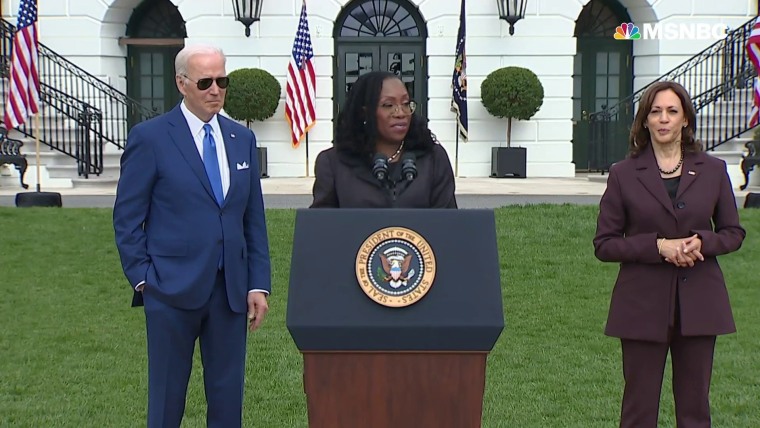Judge Ketanji Brown Jackson’s first speech following her confirmation was deeply emotional, and if you were listening closely, you heard her reveal what her modus operandi would be once she’s seated.
“It is an honor — the honor of a lifetime — for me to have this chance to join the court," she said, "to promote the rule of law at the highest level, and to do my part to carry our shared project of democracy and equal justice under law forward and into the future."
Progressive legal opinions may serve as road maps for court arguments that liberate down the line.
The court’s six Republican-appointed justices seem all but certain to gut many of the most essential constitutional protections in American life, from abortion rights to voting rights and virtually everything in between. And yet, the dissenting opinions Jackson could write will have tremendous potential to shift and shape public opinion and help establish legal precedent in the future, just as her words seem to suggest. In my view, that makes her America’s next top author.
The notion isn’t far-fetched.
In a 2015 op-ed for The Washington Post, constitutional law professor David Cole wrote that a dissent’s influence “depends on its ability to articulate a more appealing vision of what the law should be.
"Majority opinions are exercises in power; dissents are appeals to our better judgment," he wrote.
The court’s current conservative majority is proving that even widely popular laws can be nullified through dubious legalese. Conversely, astute, progressive legal opinions may serve as road maps for court arguments that liberate down the line — and there’s really no telling how far down the line that would be.
That was the case in 1896, when Justice John Marshall Harlan wrote the lone dissenting opinion in Plessy v. Ferguson, the court ruling that permitted segregation under the 14th Amendment. Harlan’s dissent is famous today, partly because it foresaw a future of racial equality that was eventually supported by the court’s decision in Brown v. Board of Education in 1954, which outlawed segregation in public schools.
“In my opinion, the judgment this day rendered will, in time, prove to be quite as pernicious as the decision made by this tribunal in the Dred Scott Case,” Harlan wrote, referencing the court’s 1857 ruling against Black citizenship.
“Our Constitution is color-blind, and neither knows nor tolerates classes among citizens,” he added.
It took about 60 years for those views to be buttressed by the Supreme Court. But there’s no guarantee Jackson would have to wait that long for her dissenting opinions to be written into law.
In Cole’s Post op-ed, he noted Justice Antonin Scalia wrote a number of dissenting opinions that, in Cole’s view, were unlikely to become law. That is, unless one hypothetical situation were to occur (remember, this was 2015):
Unless, of course, President [Marco] Rubio appointed a justice sharing Scalia’s perspective to replace one of the current liberal justices. In that case, there would be a solid conservative majority, Justice Anthony Kennedy would lose his status as swing voter, and many of Scalia’s views would have five votes.
In hindsight, we know how feasible that scenario of right-wing court domination truly is. And if Scalia’s regressive, dissenting opinions could be made into law, Jackson’s dissenting opinions could eventually be codified, as well. Perhaps sooner than it seems.
Related:
